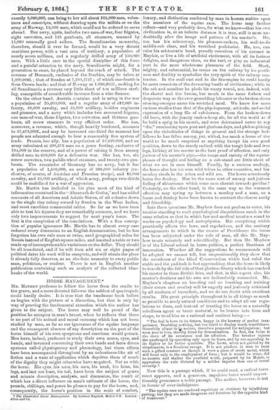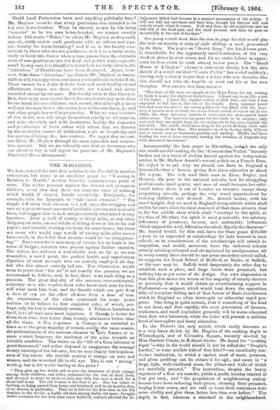HORSE MANAGEMENT.*
Mn. MATHEW professes to follow the horse from the cradle to the grave, and a more devoted follower the noblest of quadrupeds could hardly desire. It is true that the handsome book before us begins with the picture of a dissection, but that is only by way of proving the fundamental attention which the author has given to the subject. The horse may well be proud of the position he occupies in man's breast, when he reflects that there is no part of his animal and moral economy which has not been studied by man, as far as our ignorance of the equine language and the consequent absence of any description on the part of the horse himself of his own symptoms and emotions would permit. Men have, indeed, professed to study their own noses, eyes, and hands, and invented concerning their own beads and faces divers systems called physiognomy and phrenology, but these efforts have been accompanied throughout by an unbusiness-like air of fiction and a want of application which deprives them of much of the dignity they might otherwise have acquired. Not so with the horse. His eyes, his nose, his ears, his neck, his loins, his legs, and last not least, his tail, have been the subject of grave and minute description, analysis, and discussion, the result of which has a direct influence on man's estimate of the horse, the pounds, shillings, and pence he pleases to pay for the horse, and, consequently, the horse's position in the scale of comfort, • The Illustrated Horse Management. By Edward Mayhew, 31.11.0.V.S. London: Allen and Co.
luxury, and distinction conferred by man in human stables upon the members of the equine race. The horse may further reflect—and very probably does, for what we know—that his own civilization is, at an infinite distance it is true, still is most un- doubtedly after the image and pattern of his master's. He, too, has his aristocracy, his pleasure-seekers, his well-to-do middle-cob class, and his wretched proletariat. He, too, can raise his aristocratic head, proudly conscious of hie coronet in Mayfair, or live a life of artificial excitement, with all its furious delights, and dangerous vices, on the turf, or play an influential part in the more wholesome pleasures of the field. Sleek,
mighty, and substantial, he seems on the railway by his portli- ness and docility to symbolize the yery spirit of the railway con- tractor. In the mail cart and in the fire-engine he could hardly
be more conscious of the devouring bustle of civilization ; while in the cab and omnibus he plods his weary round, not, indeed, with the shovel and the broom, but much in the same forlorn and desperate way as the ever-grumbling labourer or the broken-down crossing-sweeper earns his wretched meal. We know few more curious studies than that of the physiognomy, attitude, and social expression of a long file of cab-horses. From the broken-down old beau, with the jaunty cock-a-hoop air, for all the world as if he held a sprig in his mouth, and were determined never to say "die," ruminating upon past and glorious days, and philosophizing
upon the vicissitudes of things in general and the strange bed- fellows he has fallen among, yet, withal, too much a horse of the world to be much surprised at anything except his own good qualities, down to the sturdy radical, with the tough hide and iron legs, kicking at his master as the best proof of affection, and only
jealous of his master's pipe,—the range and variety of the equine phases of thought and feeling on a cab-stand are little short of what we see in man himself. Finally, by a curious analogy, the horse also has his own wild tribes iu other countries, and his monkey rivals in the zebra and wild ass. The horse notoriously hates the donkey. Has he the same sort of uneasy and jealous feeling of abhorrence which some men cherish towards gorillas ?
Certainly, on the other hand, in the same way as the warmest affection may spring up between a monkey and a man, so a horse and donkey have been known to contract the closest amity and friendship.
Into these questions Mr. Mayhew does not profess to enter, his treatise standing to such psychological disquisitions much in the same relation as that in which law and medical treatises stand to works on psychology and metaphysics. But everything which practically affects the laws, and regulations, and the sanitary arrangements to which in the course of Providence the horse has been subjected under the rule of man, all this Mr. May- hew treats minutely and scientifically. But then Mr. Mayhew is of the Liberal school in horse politics, a perfect Bentham of innovation. Whether all the suggestions he recommends will be adopted we cannot tell, but unquestionably they show that the overthrow of the blind Conservatism which had ruled the stable and the paddock is fast approaching, that the horse is likely to benefit by the full tide of that glorious liberty which has reached his master in these British isles, and that, in this aspect also, his master's destinies and his own are indissolubly connected. Mr. Mayhew's chapters on breeding and on breaking and training (their errors and results) will be eagerly and jealously criticized by all students of horseflesh, and we do not doubt with excellent results. His great principle throughout is in all things as much as possible to study natural conditions and to adapt all our regu-
lations to them, and instead of treating the horse as a naturally rebellious agent or brute material, to be beaten into form and shape, to treat him as a rational and sentient being :— "The foal is born to its fetters, happy in the bravery of perfect inex- perience. Doubting nothing, but too timid to display much trustfulness. Graeefully pliant in nature, therefore prepared for subjugation; but soon wou to love, thereby fitted for domestication. In fact, the horse is the slave of its reverence and its affection. The breaker injures the quadruped by operating only upon its fears, and by not appealing to its higher or its better qualities. The horse, when not guided by its attachments, is a ferocious savage. It is not prudent in man to treat such a gifted creature as though it were a piece of crude metal, which will bend only to the employment of force ; but it would be wiser, did he receive and shelter the youthful spirit, prepared by its Maker, to appreciate the rule dictated by a milder impulse than one of brutal severity:: Now this is a passage which, if he could read, a radical horse must approve, and a generous, impulsive horse would unques- tionably pronounce a noble passage. The author, however, is not in favour of over-indulgence.
"The equine race are rendered capricious or the o obstinate by injudicious
kind
petting; but they are made dangerous and ferocious by opposite of treatment."
Could Lord Palmerston have said anything politically finer ? Mr. Mayhew remarks that every gentleman was intended to be his own horse-breaker. What he exactly means by his being "intended" to be his own horse-breaker, we cannot exactly fathom. Did man's "Maker," to whom Mr. Mayhew so eloquently appeals, really endow each gentleman with an inborn and sepa- rate faculty for horse-breaking ? and if so, is the faculty non- existent in those who are not gentlemen, or is it in a latent state, ready to burst into bloom when a man passes from the chrysalis state of non-gentleman into the final and perfect state,—gentle- man? In any csse,it is dreadful to think how woefully hitherto the "intentions" of Providence have been disobeyed. Apart, how- ever, from these " intentions," (so clear to Mr. Mayhew so inscru- table to us),the suggestion contains a profound truth in horseflesh. There cannot be a doubt that the best and most intelligent and affectionate horses are those which are trained and never mounted except by one man. But the objection to this theory is, first, that every man cannot break his own horses any more than he can break his own children; and second, that although a horse will snit the man better who trains him to his own fancy, he will suit other people less well in proportion. What we want is horses of the world, who will adapt themselves readily to all tempers, and seize cheerfully and with instinctive facility the character aud peculiarities of those riders with whom they are thrown by the multiplex causes of civilization, each as hospitality and the system of hiring, &c., into contact. We regret that we can- not follow Mr. Mayhew through his most agreeable and instruc- tive manual. But we are tolerably sure that no horseman who can afford to buy it will regret the purchase of Mr. Mayhew's Illustrated Horse Management.

































 Previous page
Previous page